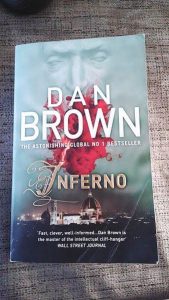
Before I started studying, I had oceans of time to read. Besides high literature like The World of Sophie by Jostein Gaarder, I also just read books from the Bruna Top Ten. So did the Angels & Demons-series by Dan Brown, the fourth part of which was recently filmed. However, director Ron Howard has considerably spoiled the ethical issue with which the book ends. The film Inferno is yet another victim of Hollywood's end-good mentality.
Dan Brown's book series is about Professor Robert Langdon, who has to solve book after book of various art history puzzles, each time accompanied by a different woman. Various conspiracy theories (Illuminati, the Holy Grail) and secret societies (Freemasons, Order of the Rose) are linked to a different problem or dilemma each time. In Inferno the medieval writer Dante Alighieri is used to raise the issue of overpopulation and climate change.
Langdon is embroiled in a puzzle by millionaire and biochemist Bertrand Zobrist: follow the trail of riddles (each linked to Dante's Inferno) and solve it within a few days, to prevent a good portion of humanity from dying. As it turns out (spoiler alert!): when Langdon reaches the end point, the virus has already spread. However, Brown gives the book an interesting twist here: instead of mass murder, the virus causes mass sterilisation.

Mass murder or prevent new life?
Forced infertility as a solution to overpopulation is an interesting ethical issue. With Zobrist's virus, a third of humanity has been rendered infertile, without having any choice in the matter. After all, what are a few million unborn children within the history and future of all humanity? Zobrist took matters into his own hands and cut the knot without any democratic chatter.
In the heyday of Western democracy, the big picture is in danger of disappearing from view. Zobrist saw that too. His vector virus worked on a completely random basis, so it simply became a matter of luck. Brown wanted to work with Inferno show that there is no simple solution to the problem of overpopulation, and that an extremist like Zobrist may be a necessary evil. In an interview with the BBC he says it is a terrible act, but at the same time a moral, ethical and scientific grey area: "You're left to ponder the ideas. I don't have the answer."
Dilemmas or dollars?
With his film adaptation of Inferno this dilemma to the silver screen? Simple: he doesn't. The issue the book ends with is simply written out. The film follows the general storyline, but (spoiler alert!) when Langdon has solved the final puzzle, the virus has not yet spread. No mass murder or mass sterilisation, just end well, all's well.
Why change the ending? The source material offers Inferno the measured chance to stand out from the other blockbusters, but now the film disappears into the ever-growing pile of average Hollywood clutter. The folks at the website DenofGeek.com spoke Howard about the new ending. The reason for the change? The book's ending is insufficiently "cinematic," according to the director.

According to Howard, the ending worked great for a novel, but in the film, it required a huge amount of exposition to make clear exactly what Zobrist's virus was affecting. According to him, a multitude of explanations also took the momentum out of his earlier film adaptations of Brown's series (The DaVinci Code and Angels & Demons). In Inferno he hoped to avoid this in this way.
How did Brown view the new ending? Presumably, he saw little more than dollar signs in his eyes. To CinemaBlend Brown told How the conversation with the film studios went: "I saw the first draft and said, 'Hey, the ending is different.' ' And they said, 'Yep.' And that was pretty much the conversation."
Hollywoodification or faithful adaptation?
Brown thus had little to do with the ending and his absence is also noticeable in the rest of the film. The story should be full of art references and various historical theories, but is sped up to the point where it becomes a semi-intellectual action film. Everything has to be fast, fast, fast! Millions of lives are at stake! But not to worry: after the obligatory, intense gunfight during the climax, the hero still saves everyone again!
If every adaptation is treated like this, blockbusters in the future will contain no interesting or innovative content. Then every film adaptation will just be an average action movie like Jack Reacher. Inferno has fallen prey to 'Hollywoodification': an emerging trend where an interesting story is transformed into a standard blockbuster in the hands of the big studios.
Film reviewers also see this evil development taking place, including Jamie East of The Sun. East is in his review from Inferno almost exclusively negative about the film. He concludes his review by saying, "Annoyingly, the ending of the book has been 'Hollywoodised' beyond recognition." His colleague Fred Hawson of ABS-CBN News agrees and says the team behind Inferno made the choice to "Hollywoodise the ending of the film as contrasted from the book."

Professor or action hero?
Ron Howard has come from Inferno made yet another average action film: a rich bad guy threatens to commit mass murder, only our hero can stop him. Accompanied by a handsome woman, he ends up saving humanity. Robert Langdon and the World Health Organisation fit right in with Jason Bourne, Batman and Captain America. The original ending from the book is far from it.
It is a pity that such an issue as too rapid population growth is not presented to the general public in a different way. In doing so, Howard misses the opportunity to set in motion an interesting (and above all necessary) social debate. The mainstream film world could use some interesting content, but with directors like Ron Howard, I fear that will take a very long time.
